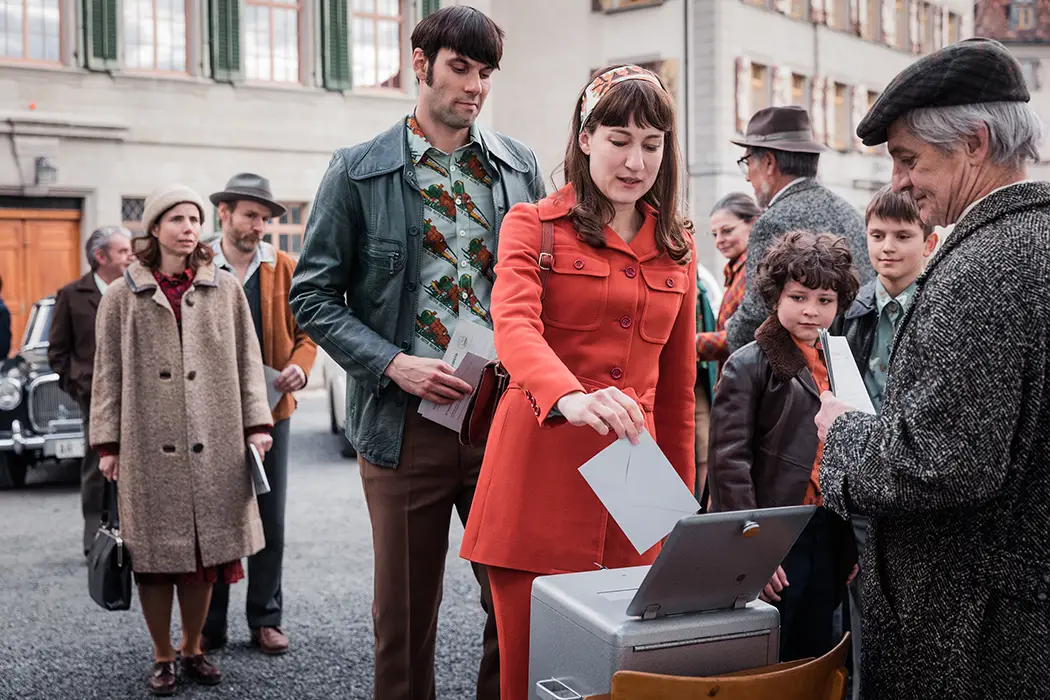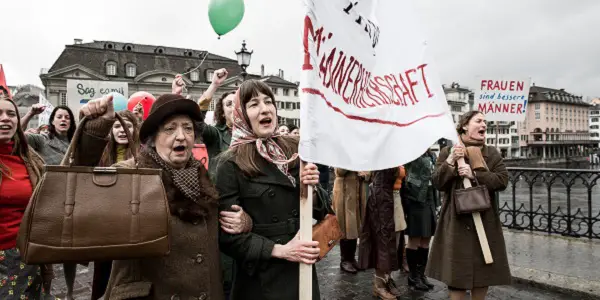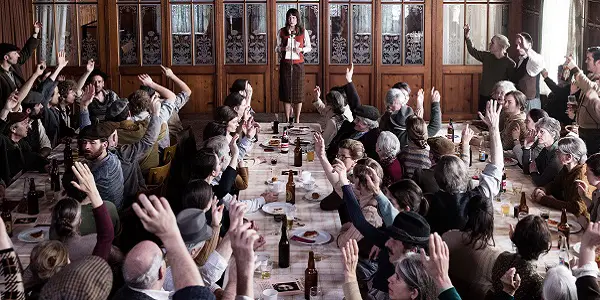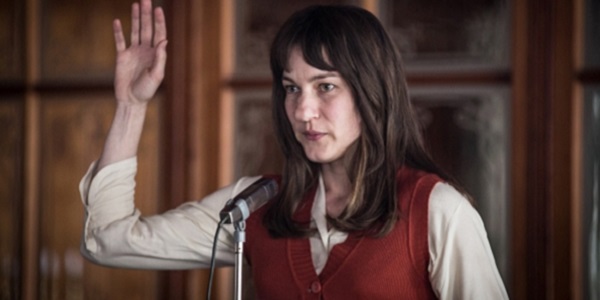THE DIVINE ORDER: The Fiercely Inspiring Story Of The Swiss Struggle For Women’s Suffrage

Lee Jutton has directed short films starring a killer toaster,…
If you were to place a bet as to when women in Switzerland won the right to vote, you probably wouldn’t have staked your life savings on a date as late as 1971. Switzerland – the Central European country renowned for its stubborn neutrality, secure banking, ski resorts and delicious chocolate – was actually backwards enough to have denied women the right to vote until well into the twentieth century? You better believe it.
In her rousing new film The Divine Order, Swiss writer-director Petra Volpe casts a bright light on the struggle to extend the women’s liberation movement of the late Sixties into the most remote reaches of Switzerland and convince men to vote in favor of women’s suffrage. By filtering such a grand endeavor through the eyes of one village housewife, Volpe makes the political incredibly personal. The resulting film is alternately hilarious and heartbreaking, inspiring and infuriating – in other words, a perfect film for these troubled times.
Votes for Women
Nora (Marie Leuenberger) is a housewife and mother in a small village in the Swiss countryside. Every day, she drops her two sons off at school, cleans the house, cares for her grouchy live-in father-in-law, and assists her put-upon sister-in-law, Theresa (Rachel Braunschweig) with chores on the family farm. But Nora wants something more – specifically, she wants to return to work. However, her husband, Hans (Maximilian Simonischek), believes that a woman’s place is in the home, and reminds her that according to Swiss marriage law, he can actually forbid her from getting a job. Angered by this injustice and inspired by her rebellious niece, Hanna (Raw’s Ella Rumpf), Nora begins reading up on the women’s liberation movement.

Nora’s corner of the world was barely touched by the global social upheaval experienced in the late Sixties, but that’s about to change. A federal referendum will be held on February 7, 1971 to decide if Swiss women should finally be granted the right to vote. Inspired by an activist who tells her that no change will ever happen if people don’t speak up, the normally meek and mild Nora starts publically voicing her opinion in favor of women’s suffrage – first at a gathering of the local women’s committee, then at an informational community meeting she organizes with the help of elderly spitfire Vroni (Sibylle Brunner) and Italian restaurateur Graziella (Marta Zoffoli).
Soon, Nora abandons her frumpy, nineteenth-century peasant wardrobe for tight jeans and shaggy bangs – surface changes that reflect her newly modernized worldview. She and her friends participate in a demonstration in Zurich, attend a seminar about learning to love their bodies, and organize a strike of all the women in the village. But all of their efforts will come to naught if their husbands, fathers and sons reject the referendum on February 7, unwilling to upset what they have so long believed is “the divine order” of society.

Upsetting the Order
The Divine Order focuses on a fictional small-town activist instead of a famous political leader, but because of that, the film’s story is all the more remarkable and relatable. As played by the infinitely likable Leuenberger, Nora could be a stand-in for anyone who has ever realized that they deserve better and tried to do something about it, even on the smallest scale.
In one particularly apt scene towards the beginning of the film, Nora describes the fish that live at the bottom of the ocean to her two boys and tells them that because these fish have never seen daylight, they have no idea what they’re missing out on. After all, you cannot miss what you have never had – or can you? It’s a powerful little moment that signifies the great change to come in Nora.
Volpe’s script is full of moments like this – moments that contain multitudes. It’s easy to see why Switzerland chose it as their submission for Best Foreign Language Film at this year’s Academy Awards. It’s also surprisingly funny, with Volpe managing to find the humor amid the injustice and to laugh with her small-town characters instead of at them. In addition, The Divine Order contains some of the most vibrant and realistic portrayals of female friendships that I have seen in the movies in quite some time.
Yet one of my favorite things about the film was the complex relationship between Nora and her husband, Hans. Hans could very easily have been portrayed as either as straight-up sexist villain or as a saintly supportive husband. (The cartoon villain role is instead given to Hans’ brother, Werner, who takes out the frustrations of having to run the family farm on the long-suffering Theresa.) But Hans is a far more complicated character than that.

Hans is a man who loves and respects his wife, but still can’t comprehend why she wants more out of life than cleaning his house and caring for his father. He is in favor of women having the right to vote, but he’s too afraid to share his opinions with the rest of the village, even as they harangue Nora over her quest. When Nora voices a desire to get out of the house and go back to work, Hans instead books plane tickets for a long-overdue holiday, assuming that a trip to the Cote d’Azure will assuage her desire for a change of scenery.
When Nora informs him that she’d rather have a job than a vacation, his face falls. “I’m trying,” he tells her, and indeed he is, but it takes him a bit longer and a lot more trying before he finally understands the depths of Nora’s desires. Speaking of desires: the scene in which a furious and frustrated Nora reveals to Hans that she’s never had an orgasm is spectacularly funny.
While Hans is a man of his time and place and upbringing, his opinions are not unchangeable – especially when the person doing the persuading is his beloved wife. Their calm and steady marriage is put through the wringer as a result of Nora’s activism, but watching them work through their disagreements to create a better partnership is a more powerful testimonial for the institution of marriage than any perfect fairy-tale romance.
Conclusion: The Divine Order
The Divine Order is a fierce, fiery film that should be seen by anyone who feels helpless in the ongoing struggle for equality, anyone who feels that their voice is too small to be heard or their cause too misunderstood to gain traction. It will ignite the desire for social change in even the most contented and privileged of people and remind you that – to paraphrase a famous fellowship-leading wizard – even the smallest person can help change the course of the future.
What do you think? Were you shocked to learn how long it took for women in Switzerland to get the right to vote? Share your thoughts in the comments below.
The Divine Order was released in theaters in New York on October 27, 2017 and will be released in Los Angeles on November 17, 2017. You can find more international release dates here.
Does content like this matter to you?
Become a Member and support film journalism. Unlock access to all of Film Inquiry`s great articles. Join a community of like-minded readers who are passionate about cinema - get access to our private members Network, give back to independent filmmakers, and more.
Lee Jutton has directed short films starring a killer toaster, a killer Christmas tree, and a not-killer leopard. Her writing has appeared in publications such as Film School Rejects, Bitch: A Feminist Response to Pop Culture, Bitch Flicks, TV Fanatic, and Just Press Play. When not watching, making, or writing about films, she can usually be found on Twitter obsessing over soccer, BTS, and her cat.













